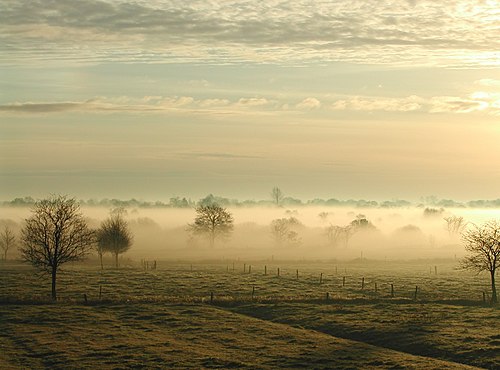Condensationnoun
The act or process of condensing or of being condensed
Condensationnoun
The state of being condensed.
Condensationnoun
(physics) The conversion of a gas to a liquid.
Condensationnoun
The condensate so formed.
Condensationnoun
(chemistry) The reaction of two substances with the simultaneous loss of water or other small molecule.
Condensationnoun
The act or process of condensing or of being condensed; the state of being condensed.
Condensationnoun
The act or process of reducing, by depression of temperature or increase of pressure, etc., to another and denser form, as gas to the condition of a liquid or steam to water.
Condensationnoun
A rearrangement or concentration of the different constituents of one or more substances into a distinct and definite compound of greater complexity and molecular weight, often resulting in an increase of density, as the condensation of oxygen into ozone, or of acetone into mesitylene.
Condensationnoun
(psychoanalysis) an unconscious process whereby two ideas or images combine into a single symbol; especially in dreams
Condensationnoun
the process of changing from a gaseous to a liquid or solid state
Condensationnoun
atmospheric moisture that has condensed because of cold
Condensationnoun
the process or result of becoming smaller or pressed together;
Condensationnoun
a shortened version of a written work
Condensationnoun
the act of increasing the density of something
Condensationnoun
water which collects as droplets on a cold surface when humid air is in contact with it
Condensationnoun
the conversion of a vapour or gas to a liquid
Condensationnoun
a reaction in which two molecules combine to form a larger molecule, producing a small molecule such as H₂O as a by-product.
Condensationnoun
the fusion of two or more images or ideas into a single composite or new image, as a primary process in unconscious thought exemplified in dreams.
Condensationnoun
a concise version of something, especially a text
Condensation
Condensation is the change of the physical state of matter from the gas phase into the liquid phase, and is the reverse of vaporization. The word most often refers to the water cycle.
Fognoun
(uncountable) A thick cloud that forms near the ground; the obscurity of such a cloud.
Fognoun
(uncountable) A mist or film clouding a surface.
Fognoun
A state of mind characterized by lethargy and confusion.
Fognoun
(photography) A silver deposit or other blur on a negative or developed photographic image.
Fognoun
(computer graphics) Distance fog.
Fognoun
A new growth of grass appearing on a field that has been mowed or grazed.
Fognoun
Tall and decaying grass left standing after the cutting or grazing season; foggage.
Fognoun
(Scotland) Moss.
Fogverb
(intransitive) To become covered with or as if with fog.
Fogverb
(intransitive) To become obscured in condensation or water.
Fogverb
To become dim or obscure.
Fogverb
(transitive) To cover with or as if with fog.
Fogverb
(transitive) To disperse insecticide into (a forest canopy) so as to collect organisms.
Fogverb
(transitive) To obscure in condensation or water.
Fogverb
(transitive) To make confusing or obscure.
Fogverb
To make dim or obscure.
Fogverb
To practice in a small or mean way; to pettifog.
Fogverb
(transitive) To pasture cattle on the fog, or aftergrass, of; to eat off the fog from.
Fogverb
(intransitive) To become covered with the kind of grass called fog.
Fognoun
A second growth of grass; aftergrass.
Fognoun
Watery vapor condensed in the lower part of the atmosphere and disturbing its transparency. It differs from cloud only in being near the ground, and from mist in not approaching so nearly to fine rain. See Cloud.
Fognoun
A state of mental confusion.
Fognoun
Cloudiness or partial opacity of those parts of a developed film or a photograph which should be clear.
Fogverb
To pasture cattle on the fog, or aftergrass, of; to eat off the fog from.
Fogverb
To practice in a small or mean way; to pettifog.
Fogverb
To envelop, as with fog; to befog; to overcast; to darken; to obscure.
Fogverb
To render semiopaque or cloudy, as a negative film, by exposure to stray light, too long an exposure to the developer, etc.
Fogverb
To show indistinctly or become indistinct, as the picture on a negative sometimes does in the process of development.
Fognoun
droplets of water vapor suspended in the air near the ground
Fognoun
an atmosphere in which visibility is reduced because of a cloud of some substance
Fognoun
confusion characterized by lack of clarity
Fogverb
make less visible or unclear;
Fognoun
a thick cloud of tiny water droplets suspended in the atmosphere at or near the earth's surface which obscures or restricts visibility (to a greater extent than mist; strictly, reducing visibility to below 1 km)
Fognoun
an opaque mass of particles in the air
Fognoun
cloudiness which obscures the image on a developed negative or print.
Fognoun
a state or cause of perplexity or confusion
Fognoun
the grass which grows in a field after a crop of hay has been taken.
Fognoun
long grass left standing in a pasture and used as winter grazing.
Fogverb
(with reference to a glass surface) cover or become covered with steam
Fogverb
make (a film, negative, or print) obscure or cloudy.
Fogverb
bewilder or puzzle
Fogverb
make (an idea or situation) difficult to understand
Fogverb
spray with an insecticide.
Fog
Fog is a visible aerosol consisting of tiny water droplets or ice crystals suspended in the air at or near the Earth's surface. Fog can be considered a type of low-lying cloud usually resembling stratus, and is heavily influenced by nearby bodies of water, topography, and wind conditions.































